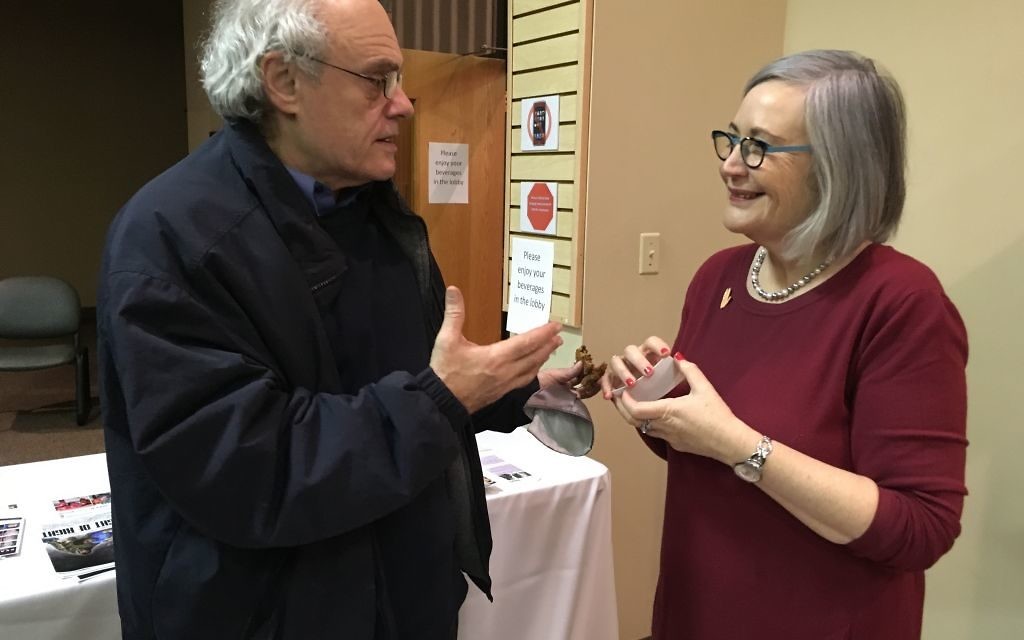Women of the Wall Keep Challenging Barriers
The divide between the men's and women's section of the Western Wall in Jerusalem has widened in recent years.

When Lesley Sachs was a child who made aliyah from South Africa at age 5, a low chain served as the divider between the equal-sized men’s and women’s sections at the Western Wall in Jerusalem.
Now in her 10th year as the executive director of Women of the Wall, Sachs said a 7-foot-high wall divides the men from the women at the Kotel Plaza, and the men’s section is more than twice the size of the women’s area. New modesty rules are enforced for women, who are forbidden to chant or sing, lest they distract the men at prayer.
“Things changed, and we weren’t there to fight it … until Women of the Wall experienced, for the first time, true violence the first time they went to pray 29 years ago,” Sachs said at Congregation Shearith Israel on Wednesday, Jan. 31. She spoke the next night at Congregation Etz Chaim.
Get The AJT Newsletter by email and never miss our top stories Free Sign Up
Sachs showed a brief video of the harassment, at times escalating to physical altercations, encountered by members of Women of the Wall when they make their monthly Rosh Chodesh pilgrimage in tallitot and kippot with Torah scrolls to pray at the wall.
Erica Hruby, the new executive director of the Center for Israel Education, said she once had the privilege to pray with Women of the Wall. “While it was not pleasant,” she said, it was “an incredibly moving opportunity” that remains close to her heart.

Rabbi Loren Filson Lapidus of The Temple said she has shared those 7 a.m. Rosh Chodesh struggles at the Kotel. “They are harassed. They are assaulted. They are arrested, all in pursuit of the simple goal of egalitarianism,” Rabbi Lapidus said. “For all of us that envision Israel as a state that is a home for all Jews, the Kotel is the symbol of how far we still have to go.”
Sachs said it’s worth enduring the ordeal “to retain Israel as a strong democracy.”
The Wall has been under the authority of Israel’s Ministry of Religion since 1967, and the ministry established the Western Wall Heritage Foundation in 1988 to “cultivate, develop and preserve the Kotel and its tunnels.”
Also in 1988, Women of the Wall was created as a way for Modern Orthodox, Conservative and Reform women to fight for gender equality in freely and openly worshipping as they wish at the one of the holiest sites to the Jewish people.
Advocacy from the Diaspora helped secure a Conservative presence at the Robinson’s Arch area in 2000, and a platform for egalitarian prayer was built in 2013.
Still, 40 women were arrested at the Wall from 2011 and 2013. Sachs was arrested for the fourth time in 2013, charged under a law allowing a fine or six months in jail “for not observing according to the custom of the place, and in a way that can offend the feelings of others.”
Photos of women in prayer shawls being led away inspired protests in the United States.
A judge ruled that Women of the Wall prayed within halacha and under the promises of gender equality and religious freedom in the Declaration of Independence. The case will go to the Supreme Court.
Jan. 31, 2016, when the government announced an agreement to build an enlarged egalitarian prayer space near Robinson’s Arch and to broaden the religious governance of the Kotel, was one of the happiest days of Sachs’ life, outside childbirth. But the Netanyahu government canceled the deal in June 2017.
Sachs said the issue is political, not religious. “The ultra-Orthodox put pressure on the prime minister, and he reneged on his promise … that there will be a place for every Jew at the Western Wall.”
The issues of gender equality and religious freedom can be a catalyst for changes in Israel beyond the Wall, Sachs said.
Israelis are unaccustomed to having choices about lifecycle celebrations, and the ability to make those decisions “is something we learned from you,” she said. “This is a present that we received from the Jews of North America.”
Another gift came directly from Georgia.
After visiting Atlanta with a group of officers, the new police chief at the Wall went to Sachs’ office, accompanied by an entourage that had arrested her so many times. He had met with the Jewish Federation of Greater Atlanta, he said, and “they nearly ate me alive.”
He said he gained an understanding of the importance of the issue to the Jewish people and would not arrest her again.
“That is to show that you have the power,” Sachs said, “and what we are asking you to do is to use it. Because, whereas Netanyahu really doesn’t care about Women of the Wall, … he does still care about you and about what you think and about how and where you are there with Israel.”
Photos by Leah R. Harrison




comments